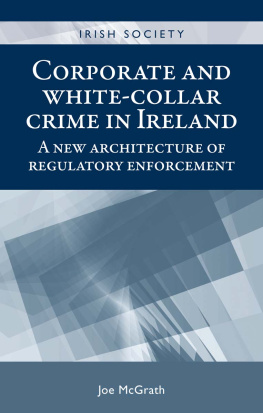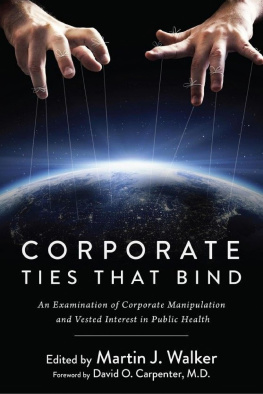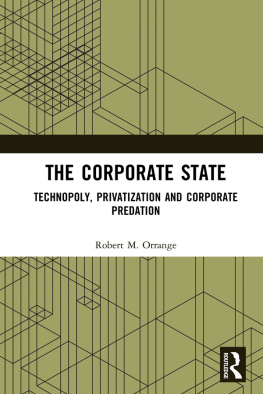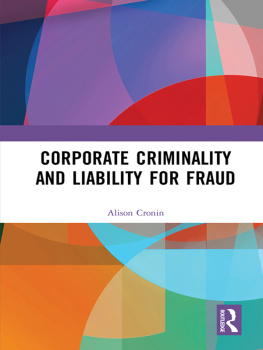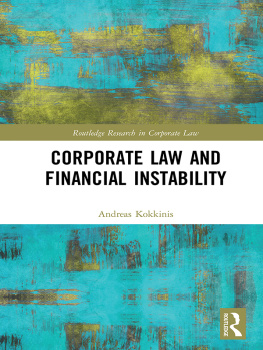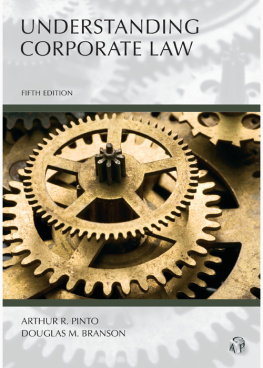CORPORATE AND WHITE-COLLAR CRIME IN IRELAND
IRISH SOCIETY
The Irish Society series provides a critical, interdisciplinary and in-depth analysis of Ireland that reveals the processes and forces shaping social, economic, cultural and political life, and their outcomes for communities and social groups. The books seek to understand the evolution of social, economic and spatial relations from a broad range of perspectives, and explore the challenges facing Irish society in the future given present conditions and policy instruments.
SERIES EDITOR
Rob Kitchin
ALREADY PUBLISHED
Public private partnerships in Ireland: Failed experiment or the way forward for the state? Rory Hearne
Migrations: Ireland in a global world
Edited by Mary Gilmartin and Allen White
The economics of disability: Insights from Irish research
Edited by John Cullinan, Sen Lyons and Brian Nolan
The domestic, moral and political economies of post-Celtic tiger Ireland: What rough beast?
Kieran Keohane and Carmen Kuhling
Challenging times, challenging administration: The role of public administration in producing social justice in Ireland
Chris McInerney
Management and gender in higher education
Pat OConnor
Defining events: Power, resistance and identity in twenty-first-century Ireland
Edited by Rosie Meade and Fiona Dukelow
CORPORATE AND WHITE-COLLAR CRIME IN IRELAND
A new architecture of regulatory enforcement
Joe McGrath
MANCHESTER UNIVERSITY PRESS
Copyright Joe McGrath 2015
The right of Joe McGrath to be identified as the author of this work has been asserted by him in accordance with the Copyright, Designs and Patents Act 1988.
Published by Manchester University Press
Altrincham Street, Manchester M1 7JA
www.manchesteruniversitypress.co.uk
British Library Cataloguing-in-Publication Data
A catalogue record for this book is available from the British Library
Library of Congress Cataloging-in-Publication Data applied for
ISBN 978 07190 9066 0
First published 2015
The publisher has no responsibility for the persistence or accuracy of URLs for any external or third-party internet websites referred to in this book, and does not guarantee that any content on such websites is, or will remain, accurate or appropriate.
Typeset in Minion by
Servis Filmsetting Ltd, Stockport, Cheshire
For my parents, Mary and Bill
Contents
Tables and figure
Tables
Figure
Series editors foreword
Over the past twenty years Ireland has undergone enormous social, cultural and economic change. From a poor, peripheral country on the edge of Europe with a conservative culture dominated by tradition and Church, Ireland transformed into a global, cosmopolitan country with a dynamic economy. At the heart of the processes of change was a new kind of political economic model of development that ushered in the so-called Celtic Tiger years, accompanied by renewed optimism in the wake of the ceasefires in Northern Ireland and the peace dividend of the Good Friday Agreement. As Ireland emerged from decades of economic stagnation and The Troubles came to a peaceful end, the island became the focus of attention for countries seeking to emulate its economic and political miracles. Every other country, it seemed, wanted to be the next Tiger, modelled on Irelands successes. And then came the financial collapse of 2008, the bursting of the property bubble, bank bailouts, austerity plans, rising unemployment and a return to emigration. From being the paradigm case of successful economic transformation, Ireland has become an internationally important case study of what happens when an economic model goes disastrously wrong.
The Irish Society series provides a critical, interdisciplinary and in-depth analysis of Ireland that reveals the processes and forces shaping social, economic, cultural and political life, and their outcomes for communities and social groups. The books seek to understand the evolution of social, economic and spatial relations from a broad range of perspectives, and explore the challenges facing Irish society in the future given present conditions and policy instruments. The series examines all aspects of Irish society including, but not limited to: social exclusion, identity, health, welfare, life cycle, family life and structures, labour and work cultures, spatial and sectoral economy, local and regional development, politics and the political system, government and governance, environment, migration and spatial planning. The series is supported by the Irish Social Sciences Platform (ISSP), an all-island platform of integrated social science research and graduate education focusing on the social, cultural and economic transformations shaping Ireland in the twenty-first century. Funded by the Programme for Research in Third Level Institutions, the ISSP brings together leading social science academics from all of Irelands universities and other third-level institutions.
Given the marked changes in Irelands fortunes over the past two decades it is important that rigorous scholarship is applied to understand the forces at work, how they have affected different people and places in uneven and unequal ways, and what needs to happen to create a fairer and prosperous society. The Irish Society series provides such scholarship.
Rob Kitchin
Foreword
Rare is the study that makes economic crimes by high-status individuals the subject of criminological research and criminal law theory. Rarer still is the study that does so in the context of a globally influential model of economic development in the neoliberal age such as Ireland. When work of this scientific and legal significance is written in an engaging, historically informed narrative that can be accessed by the widest audience of lawyers, criminologists, business leaders and concerned citizens, you have the makings of a future classic. Joe McGraths study of corporate and white collar crime in Ireland is just that.
This is a study of the evolution of Irish corporate criminal liability, and its enforcement, from independence through the financial crisis of 2008. The author argues that for most of the twentieth century Ireland addressed corporate and business wrongdoing more generally through a model that was heavily reliant on conventional criminal law, policing and prosecution and which, somewhat paradoxically it might seem, were remarkably lenient. Starting in the 1990s, the architecture of enforcement changed. The monopoly of criminal law authorities, the Garda Siochana and the governments central prosecution service was broken up in favour of a number of regulatory agencies. This new model was much more reliant on cooperative efforts to encourage compliance, as well as civil sanctions and orders. Paradoxically, the new model also appears to have been more punitive (or at least less lenient) toward corporate wrongdoers (both companies and company officers). This new model is expressly compared to the responsive regulatory model that has been promoted as a restorative justice approach to business crime and which is an innovative international model. Since 2008, the architecture is possibly being shifted once again through the introduction of a layer of new legislation reflecting an expressive objective of denouncing corporate wrongdoers as the moral equivalents of traitors and terrorists, and to highlight the tough on crime credentials of government.

